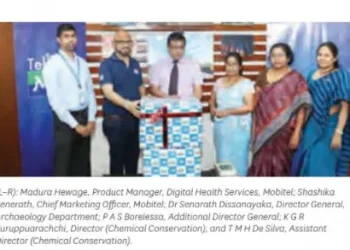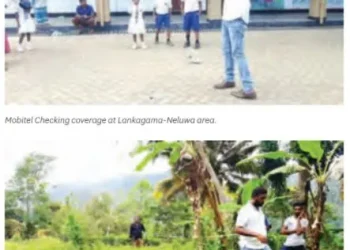As the Chairman of Sri Lanka Telecom (SLT), Rohan Fernando has a massive task in his hands to take the telecommunication giant to the next level. He has already taken many initiatives to strengthen the relationship between the management and the staff, especially the many unions at SLT. Considering himself a disruptor he always ensures that questions are asked when they should be so that it would enable greater performance of the organization. The aim is to focus on the core business of SLT, where all arms will be brought under one unifying umbrella.
By Udeshi Amarasinghe. Photography Menaka Aravinda.
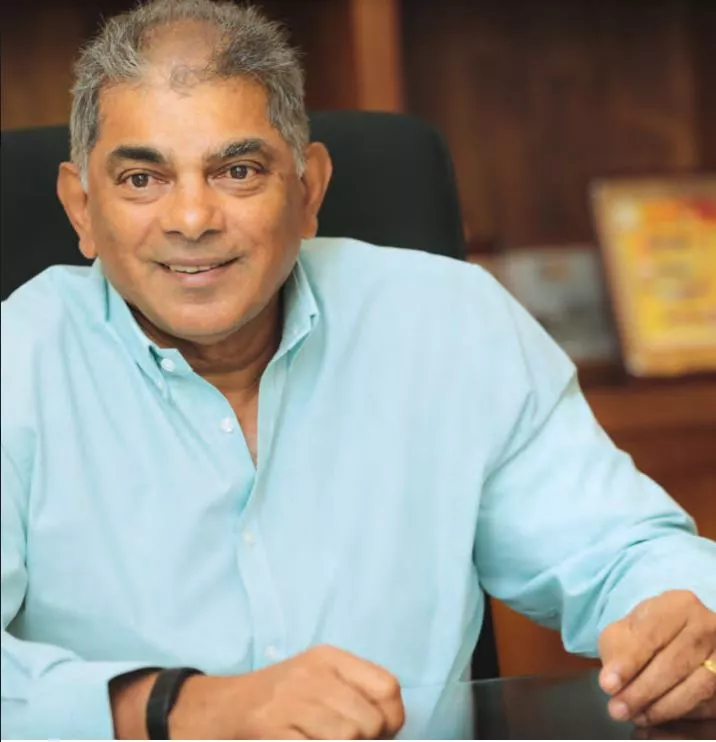
Why SLT?
I never applied for this position, nor did I ever dream of ever having to take up the position of Chairman at SLT. But it was an invitation extended to me by His Excellency the President, which I could not refuse and here I am. I am working towards making SLT the best company in Sri Lanka in every aspect and I am confident in achieving this goal.
Your background is in tea. Would you agree that telecommunication and tea are two vastly different fields?
Don’t forget that both tea and telecommu- nication start with the letter T. When it comes to management and marketing of a product or service there are common threads and no two industries are vastly different. SLT has been a service provider of primarily in the engineering field but it is now being transformed into a digital marketing company. That is why I feel that my knowledge of brand marketing will benefit the company. I have noticed that SLT is operating in different compartments. There is SLT, Mobitel and PEO TV all operating in different silos. But I believe these brands are disjointed. Our next target is to unite the brand under one umbrella, where there will be a brand custodian and brand equity will be increased. Then when people say SLT, they will know SLT broadband, SLT mobile, SLT TV and so on and so forth where all the services will be connected to one thread, which is SLT, a household name in Sri Lanka. The Group is backed by an over 160-year heritage and the loyalty of customers. We intend to build on that concept to create a unified brand identity for the SLT Group. We can utilize all our resources through one channel instead of going through various segments. In that manner, we believe we can achieve a much bigger market share than we have right now.
How would your previous experiences contribute to the increased performance of SLT?
I started my career as a tea taster at Carson Cumberbatch and Co. After several years, I was offered a position at Brooke Bonds, which was the largest tea company in the world at that time. During my time at Brooke Bonds I was seconded to London to work for one year in a truly corporate and global environment. This provided me with a gamut of experience. I was at Brooke Bonds for ten years, however once they amalgamated the Unilever group with Lipton, I felt that staying in the same company would create challenges in decision making. Furthermore, there was uneasiness because we were brought into the company much later, where decision making was done mainly in London or Netherlands and not in Sri Lanka. Therefore, it was a disjointed arrangement between the Sri Lankans and the foreigners.
At that time, I was given the opportunity to revamp Heath and Company, which was facing a very difficult period. From a top stable company, I moved to revamp a dying company. But I took this on as a challenge. Many thought I was making a mistake but I wanted to prove them wrong. I was successful in turning the company around and was performing well when I received the offer to start a new company HVA in Sri Lanka by the Dutch Company, HVA Holdings BV. Together with the team I took upon this challenge as well and we built the company. Today this company is known as HVA Food, and HVA Lanka is the holding company. Heladiv is the brand that we created and built. It is a globally selling international brand with a presence in over 40 countries.
I am bringing my experience in management and brand building to SLT, where I will look at ways to impart that knowledge to the highly technical and experienced staff at SLT and take this company to the global platform.
What are your plans as the Chairman for the telecommunication giant? There are many plans, because when I took over as the Chairman, I did not know the extent of the company except for what I had seen on the surface as one of the largest conglomerates in Sri Lanka. Upon further analysis I found that the Group had good resources and potential than what appeared on the surface.
One of the challenges that I was warned of was industrial disputes; such as trade unions and strikes. My first target was to meet the staff and the trade unions and explain to them as to what my mission was as directed or expected by His Excellency the President. Since then we have had a very good relationship. We were able to resolve many of our issues through discussion. Some of the issues were continuing for the past five to six years without a proper solution. One such issue was the Human Capital Service (HCS), which was a company that was haphazardly formed to supply manpower to SLT but operating as a subsidiary company of SLT. This created many issues for the Group as well as HCS. We resolved all issues on a very historic day on May 1, under lockdown at a special board meeting to absorb or regularize the services of 1,900 staff. It was a landmark decision that we made, which brought in goodwill for the company and also motivated the staff. I feel we are now well set to go after our real potential.
I am also looking at ways of minimizing waste and creating revenue from materials that are considered waste. For example, the pure copper wires from our defunct cables have been haphazardly sold to various parties without a proper system. I have asked them to take a complete inventory and provide me with the details. Similarly, along the railway tracks around Sri Lanka there are unused telegraphic posts, which are metal. Here too, I have asked our staff to take a complete inventory. By selling these through the proper systems and channels we could generate income for the organization. Branding our telegraphic posts and towers around the country is also another endeavor we are looking at. Similarly, there are many areas, we are currently working on.
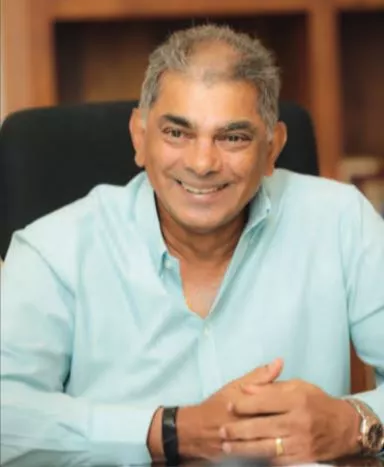
What has been achieved so far during the few months that you have been the Chairman?
Primarily we have understood some of the gaps. One area that we found lacking was that sufficient research and development was not done at SLT. In any global company if you do not engage in R&D, the company would stagnate and not perform. Therefore, we have empowered the R&D Department at SLT. I am personally involved in R&D as it is my passion.
We have identified new processes and we are cutting down on wastage. We have 10,000 staff at SLT. The lockdown period put us to the test. During that time, we had people on the ground, on telegraphic posts, inside tunnels, going into households, diving in the sea to provide the required services. No one realized this because we did not have any disruption to our services. We felt that was our greatest strength. If telecom services were disrupted for half an hour just imagine the chaos in this country. The entire country would have come to a standstill at least partially. That is why SLT is a very important aspect of the Sri Lankan economy. His Excellency the President has recognized this and made SLT an economically important institute and given us national status.
During the lockdown period we questioned ourselves as to whether we need to get everyone to work in head office or is there another way of doing it? We have adopted the new norm, especially at SLT, we have work from home, work close to home or work from operational pods. These are the new things that we have introduced at SLT, which are working very well. We have also sent letters to staff asking them whether they wish to work close to his or her Regional Telecommunication Offices, if so to inform us. We can empower them to go to the closest pod, or in some places work from home. In that way, traveling all the way to Colombo, for example, for a girl in Matara who may be just married and expecting a child, we can make her life much easier, and we can get a better output for the company because she has peace of mind. These are some of the new initiatives that we are implementing.
We have many towers around Sri Lanka. All these towers require power, fuel, generators, maintenance, and security. We are now looking at how best we can move on to solar battery powered services because these are not engines but small devices and circuits. Our electricity bill is over one billion rupees a year. If we can save 200-300 million rupees that would push the bottom line. It would also reduce equipment and maintenance cost.
We have laid about 56,000km of fiber optics around the country. As you know fiber optics is the latest technology and the best technology through which you can transmit high speed data, voice and so many other applications. That is the latest and fastest telecommunication highway in the world. We have accelerated the program of providing fiber optic options to households, enterprises and businesses all over the country on a need to connect basis. Our target is to connect at least 100,000 homes per month. We can convert a house to a home where people will be using our facilities for entertainment, communication, and day to day office work. We have developed a smart home concept, where we connect the household, to a distribution point in the house from which you can have SLT TV, Wi-Fi, SLT Security and many other apps. We are working on all these technologies this year. By doing that we will increase our customer base, increase our top line and prime our bottom line as well.
There are many non core businesses that this company has tread into. The modern way of doing business is to concentrate on the core and invest in profitable non-core businesses. We have very clearly identified that path and the board and the staff too have decided that we are not going to continue in non core businesses and we will focus only on the core business.
Our results for the first six months of 2020 is a good example of our progress, where we made improvements in bottom line, top-line and reduction in operational costs as never before during the past six years.
As the Chairman I addressed the entire staff of SLT in Sri Lanka. Staff who were in head office were in the auditorium and through PEO TV, we connected to all staff in every part of Sri Lanka to explain the work plan. The speech was a nine-page document and encompassed all that we want to do. I spoke for one and a half hours, and the speech was recorded in both Sinhala and English, because there were many people from the North and East and they would not have understood if I had spoken only in Sinhala. We ensured that every employee in the country had a printed copy in either English, Sinhala or Tamil, so it was not a bogus promise pledge given from a political platform, but a pledge given by the Chairman. Next year they can ask me Chairman, have you done this, if not why?
With 10,000 employees, where do we go from that point? Do we need 10,000? Where do we create jobs? This is a prime institution in the country, if we do not create jobs are we doing justice to the nation? These are some of the questions that we had. We are immediately looking at launching SLT Global. We are looking at the South East Asian region, where we feel there are opportunities for technical, and IT savvy people for deployment. We have already started a program to generate jobs for our staff to go on secondment and work outside Sri Lanka. We have spoken to our service providers, embassies and our target is to find at least 2,000 jobs for this purpose. By doing that we create an avenue for people to be recruited especially for the children of our staff. This is one of the companies where the staff want their children to be employed at SLT. That shows that this is not just a great place to work, it is the greatest place to work. When we create room at the top we can bring in new blood into the organization.
We have three technical institutions to train our staff in Welisara, Mount Lavinia and Matara. These are very well equipped IT laboratories. We can train our people. We are planning to teach our staff English starting from the lowest levels of our cadre. IT is in the English language, there is no other language for IT. We have identified that requirement and we are providing these opportunities for the staff.
Most of the staff at SLT have now developed affinity to the company and they have recognized that they can work with the management. That is why we do not have much industrial dispute despite the fact that we have 27 unions.
Over the years, the company has been giving work to outside contractors. There are 19 contractors doing work for SLT, despite the fact that we have 10,000 staff here. Whereas in the beginning everything was done by SLT because we have the capability and the resources. We have started doing most of the work through SLT staff again. We have communicated this concept with the unions as well; that is for them to work not on overtime but to do on incentive. The staff will get more money into their hands by doing actual work and the company will also benefit by getting some of the work that was going outside into the company.
We were an organization that was politically manipulated and politically influenced. That is why there were so many outsiders such as the manpower agency functioning in SLT. Thanks to the current President we have been separated from the political machinery, to stand alone strong as a nationally important institution. We have the freedom to do our work the way a corporate would do in Sri Lanka. Of course we qualify for that because we are listed in the stock exchange, and we have foreign investors; Malaysian Maxies has invested 44.4 percent and the largest percentage is held by the Government of Sri Lanka together with a few small time investors. We believe that these few changes that are taking place, will empower this company to reach new heights, because we are making good profits and from that the Government is getting a dividend. Last year, we provided two to three billion rupees in dividend to the Government of Sri Lanka in addition to 30 billion rupees in taxes. This is an institution that is important to the country and to the Government of Sri Lanka because it is a revenue generating institution, unlike some of the other state-owned enterprises, where the exchequer has to hand out even to pay salaries. I am very proud of this company.
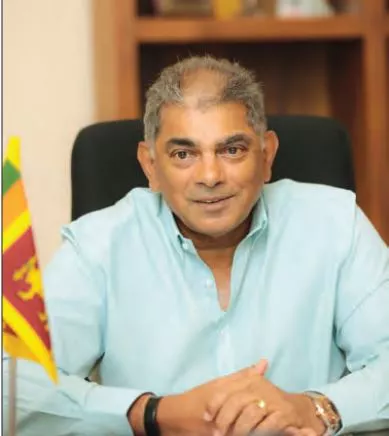
You mentioned that R&D is essential for SLT. Why do you say that?
R&D is something that I am really passionate about. When I started the company HVA, I asked myself the question: why another tea company? Because there are many tea companies in Sri Lanka. My team and I felt that we need to do new things, where we elevate the position of Ceylon Tea to a higher bracket where it is a lifestyle beverage with value. We wanted to add value and market the product. We started our R&D laboratory at HVA in 1995. We did many experiments and as a result we were the pioneers in introducing ice tea to the Sri Lankan market as ready to drink tetra packs and tea concentrates such as cordial. Today, Heladiv Ice Tea is not only sold in Sri Lanka but exported to several countries such as Australia, and Mongolia. This is primarily due to R&D.
I feel R&D is important for any company, especially those who are directly marketing to people. The consumer gets bored of the same mundane things after sometime. We have to create excitement in the consumer. For that R&D is essential, and it is required urgently at SLT. You will soon find new innovations from SLT.I feel R&D is important for any company, especially those who are directly marketing to people. The consumer gets bored of the same mundane things after sometime. We have to create excitement in the consumer. For that R&D is essential, and it is required urgently at SLT. You will soon find new innovations from SLT.
I am very confident because we have good IT people and engineers who are already developing many new platforms and products.
Recently, we launched the Helaviru platform with software support from Epic, to connect the farmer to the consumer on the concept of ‘plant to plate’. Thereby eliminating the unnecessary middleman. The farmer is empowered to know how his product, once the crops are harvested will reach the consumer at the best price with the least amount of trouble and decay. We hope to launch it islandwide through the farmer collective in a few weeks. Similarly, we have developed another app connecting the hospital network in Sri Lanka. We have connected close to 600 hospitals through our fiber lines. Medical records will be stored in Cloud with utmost privacy where you can consult a specialist in Colombo if you are in Jaffna, without coming to Colombo through the access of your records in a high definition format. You can even consult a doctor overseas if you need to because of this data availability that we are working on with the National Hospital service.
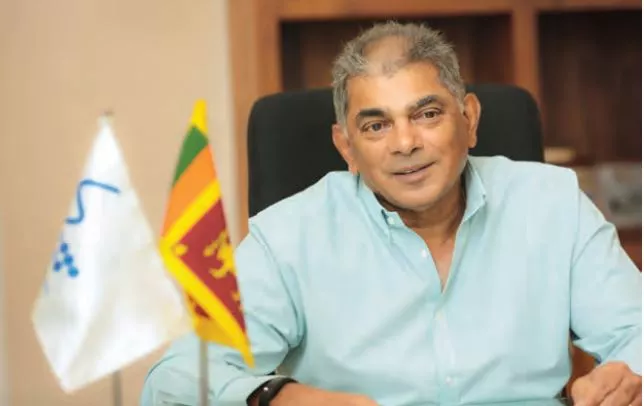
We are also developing a platform for the judiciary, where remand prisoners do not need to go to courts, which will reduce their vulnerability and they can be interrogated for the court proceedings, from the prison itself. Similarly calling dates will be provided online so that you do not need to waste time unnecessarily. All judges and lawyers can come on to that platform. New ways of doing things will happen because of the in house knowledge at SLT, which has been brought together through research and development.
How did SLT operate during the lockdown period? What are the lessons learnt to operate in the new normal?
We found our hidden strengths during the lockdown period. When everyone was saying nothing could be done we found new systems. SLT has a Business Continuation Plan (BCP). That is if things fail how do you continue your business because this is a business that you cannot stop. A factory you can close down but telecommunication cannot be disrupted even for a minute. In the BCP, there was never an area or a chapter on epidemics. We had to write this into the BCP; how do you manage the organization, how do you safeguard the staff, how do we safeguard the families of our staff and in case if one of our members gets infected by the virus how do we handle that, what is the support system? We included all of that into the BCP.
We have included another chapter on cyber security. That is to safeguard the organization against cyber attacks. We have now established the SOC – Security Operation Centre. This is a 24/7 center, where our people are watching for any form of cyber attacks or even a hint of threat. There is another system to watch over the SOC, so that if anything happens the alarms will be sounded. We have deployed so many other security systems so that the organization’s continuation is safeguarded. These are the things that happened during the lockdown period.
It also proved to us how important telecommunication is to human beings, especially Sri Lankans. Everyone was at home and they were using data so much that they found fault with SLT for charging accordingly. People did not realize that when the traffic increases the speed is reduced. What do you do? Then you have to increase the bandwidth. When you increase the bandwidth you have to pay more. You have to purchase data from the suppliers. You can buy a device but what is the fuel? Data. You have to pay for the data to run this. If you need the speed you need to pay for more data. People understood this in the hard way and the company understood this in a very hard way. People were complaining, so we devised a new system where there is no difference in day time and night time data. TRCSL is in agreement as well. That is virtually done and we are now implementing that.
The other thing is that if you have a Wi-Fi device at home, you and your entire family will use it, and then when your friends come they will use it as well. You have so many other devices; then how do you manage? We have now developed a system that when you want to get a connection, a technician will visit the customer and will determine the package after checking the number of users, devices and other required details. They will recommend the package and you do not have to worry about the package after that.
Another concern for customers is that if they have a package for a certain limit of data and they have not used that amount for the month, how would they know that the balance data has been credited for the following month. There is presently no system to value that. We are now working on an app to value the balance data, which will be carried forward and you pay for the actual usage. That will happen very soon and these are some important lessons that we learnt during the lockdown period. It taught us many lessons and bonded us with our consumer.
As you mentioned the staff at SLT are willing to work with the management, how can you build upon that?
What I have experienced by working at different companies is that they have many union problems. Because the employees, the unions and the management did not see eye to eye. They always saw the management having a luxury life while they had to suffer. It is the same in most companies today. Then at HVA we developed a different system, I told them I am their union leader, my door is open 24 hours 365 days. They were told they could contact me from anywhere in the world. In this way I started a system called dialogue before going into confrontation. Confrontation happens when dialogue breaks down. That is when your sincerity and your openness is clouded. If you are honest and you tell the staff what exactly the position is and if you practice what you preach you can reduce industrial disputes. At HVA, we have not had any industrial disputes since inception in the last 30 years. There have been court cases, where we have filed against people who have done wrong things but other than that there have been no industrial disputes. We have made decisions after discussions.
The unions at SLT used to look at the management with a squint eye. We have now broken those barriers, and we have regular discussions. What I have told the unions is do not jump into conclusions without first having a discussion around the table. If that is not possible then you can go into union action. By discussing you can resolve virtually all your issues. Through this practice we have been able to resolve many issues. It is not easy when you have such a large staff and unions to come to 100 percent consensus but we are achieving that. We have different types of unions, for every profession and category of employees. It is only the Chairman, GCEO, CPO, GCFO and Secretary who are not part of any union. Therefore, you can imagine how complex it is.
On the brighter side, I believe the unions have done a tremendous service to this company by protecting its wealth and assets. If not for these unions due to the political influences some of these assets may have even been sold. Thanks to the unions this company managed to safeguard its asset base. For that I salute the unions and I have the respect for them. I personally enjoy working with them and having dialogue with them. I attend their workshops regularly, which they started on their own initiative. Staff taking the initiative to do good things for the company is a good sign. I feel this industrial harmony starts from the boardroom not from anywhere else. The board and the Chairman have to be transparent in whatever they do. If you are transparent it goes down right to the bottom. That is what we practice. We discuss a lot of things here and if it is a critical issue affecting them we will come to a consensus. In this manner, we have completed seven months and we have not had anything unpleasant so far. I am confident we will go on like this without any disputes.
What about Mobitel?
Mobitel is our mobile arm, it has a different culture and it is far more of a new corporate type. We want to have the two cultures in one company joined at the center. We want to empower Mobitel, under proper branding and also for Mobitel to be supported by the strength of SLT since we have the largest network and we are projected as a national service. We have formed joint working groups in SLT and Mobitel and they meet at least once in two weeks to discuss the approach as one company which has never happened before. Eventually these silo operations will give way to a unified activity plan. Mobitel will also be empowered to get a bigger market share and customer base and to be much powerful with new technologies that are coming in. We hope to launch the 5G technology in the first quarter of next year. It is a completely new mobile technology. It is an unbelievable experience. There are US objections to 5G technology because of the way it is transmitted, but I feel we will clear those barriers soon. Mobitel will sooner than later deploy 5G technology. For that you need new equipment as well. Therefore, Mobitel has a great role to play in the mobile sector.
Voice no longer has a business value in terms of the telecommunication industry. What is most important is data and big data. That is what our two segments are concentrating on, delivering data. Big data is required for many operations. Even for industrial mechanization, robotics, internet of things, artificial intelligence all need raw data, which is known as big data. That is what SLT has specialized in. We have three purpose built data centers. And these data centers have stored trillion bits of data in them. Our data centers are used by both Sri Lankan and foreign companies. Both Mobitel and SLT will be focusing on increasing the data input from and within Sri Lanka. That is where Mobitel will play a major role.
For the first time we are having a President who is totally tech-savvy. What is your experience working with him?
I am absolutely thrilled about it because you cannot hoodwink him. Before speaking he studies the subject and he knows what he is talking about. He is taking the country in the right direction. In the future, the entire country will run on a digital platform. Sri Lanka is serviced by Sea- Me-We cables, which connect the world. We have five cables right now. Sea-Me-We 1,2,3,4 and 5. 1&2 are copper cables, which are now defunct. 3 is a fiber optic of the first generation and that is also being removed. 4 and 5 are currently functioning. These two cables carry billions of data. We are now looking at investing in Sea- Me-We 6 that will empower us to get information much faster and also expand our digital footprint. This new cable will be an approximately USD 1.5-billion investment by the consortium of companies in 16 nations.
Sri Lanka Telecom is one of the consortium members. Our contribution too will be quite heavy, which will be about 200-300 million dollars. We are doing that for the greater good of the country and the industry. The President is fully aware of this. He follows all the developments. If you look at most of his work, he wants to take the country to the digital platform. By doing that so many things can happen. All companies will run on ERP systems. That is all your work systems are connected. It is recorded as it happens. Therefore, companies can produce results. The records of the previous months can be produced in three to four days whereas previously it took several months. That is because of the connectivity through digitalization.
This is the direction in which the President has directed on how we should move forward in our operations; marketing, manufacturing, commerce, trade, and even foreign service. He has understood the value of the digital world. We are grateful that we have a leader who understands the way the world is moving and I believe Sri Lanka can become the digital hub for at least South East Asia because we have the technology. We have the DNA, and a 160-year legacy in SLT and we are a very stable country that is free of conflicts, we have a stable government and we do not have natural disasters like most other countries. We believe we can invite many people to come and invest in Sri Lanka in technology and other services because of the stability we have. We are thankful to the President for rekindling a feeling of national pride in our entrepreneurs and decision makers.
In conclusion, your thoughts?
I am really enjoying my tenure at SLT. I consider it as a challenge. I learn about the telecommunication industry every day, which is a learning curve for me. I enjoy working with many people because I am a people person. It is a great opportunity that I have received, thanks to His Excellency the President. I am enjoying every minute I work here. It is a pleasure and I work with passion.


